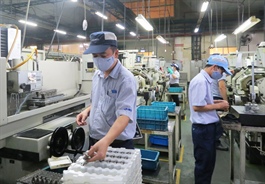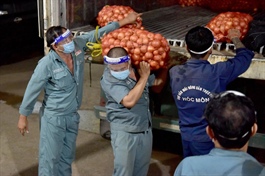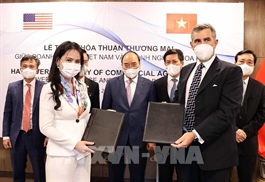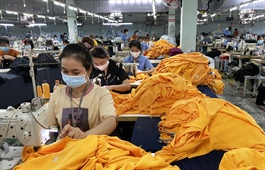Productive and diversified private sector key to Viet Nam’s economic transformation
Productive and diversified private sector key to Viet Nam’s economic transformation
As Viet Nam moves toward recovery, the development of a productive and diversified private sector will become more imperative given scarce public resources, international experts have recommended.

Viet Nam has demonstrated leadership and swift action in containing the virus since it broke out in early 2020 which made it one of the few countries in the world to register positive growth last year. However, the latest wave of COVID-19 infections since July this year has dealt a severe blow to business and employment, mirroring the downward pressure on Viet Nam’s recovery path.
To resume its ambition of realising a high-income growth trajectory by 2045, Viet Nam needs to strengthen private sector development to help the country recover from the pandemic and unlock its potential, according to the Viet Nam Country Private Sector Diagnostic (CPSD).
The report, conducted by IFC and the World Bank, which was launched yesterday, said while the private sector has played a frontline role in Viet Nam’s outstanding development in recent years, it’s now time to fully exploit the potential of this sector to boost productivity growth.
“The private sector has helped propel Viet Nam to join the ranks of middle-income economies in just one generation, and the country was preparing for its next economic transformation when COVID-19 hit,” said Kim-See Lim, IFC Regional Director for East Asia and the Pacific.
“With another wave, it’s all the more imperative for Viet Nam to help develop a dynamic, diversified and innovative private sector for the post-COVID 19 recovery phase, as public resources become scarce.”
According to the report, several factors make businesses in Viet Nam vulnerable to the crisis, including the country’s integration in trade and global value chains and its reliance on investment flows and the tourism sector. Not yet recovering from the previous infection waves, many businesses, especially small firms and firms in manufacturing, services and agriculture, suffered revenue shocks amid renewed lockdown measures.
Even after a recovery in demand, in a climate of uncertainty, being saddled with debt and negative expectations can reduce investment and threaten bankruptcies and job losses that could slow growth even further.
However, Vietnamese businesses also continue to respond to the new normal by adopting digital technologies. Close to 60 per cent of firms in September-October 2020 had adopted or increased the use of digital platforms in response to COVID-19. Uptake was higher among larger firms and service firms.
E-commerce activity has surged following the outbreak with leading e-commerce sites such as Tiki and Shopee seeing an explosion in the number of purchase orders, and big retailers have seen a dramatic increase in online sales.
Small and medium enterprises (SMEs) have been more likely to use digital platforms for less complex front-end business functions, suggesting potential capacity or resource constraints. The COVID-19 outbreak has demonstrated the urgency for Viet Nam to step up the pace of adoption and diffusion of technologies and digital solutions to support business resilience and growth.
“The country’s emerging and dynamic private sector has demonstrated resilience during the COVID-19 pandemic and has contributed in making Viet Nam one of few countries attaining positive economic growth in 2020,” said Carolyn Turk, World Bank Country Director for Viet Nam.
“Continued bold reforms are needed to create a more robust basis for competition and innovation in the economy, through which a private sector-led low-carbon economic growth model can enable Viet Nam’s goal of becoming a high-income country by 2045.”
Productivity-driven growth
Viet Nam’s ambition will require it to ramp up productivity growth and develop on a new growth model, the report said.
The country’s rapid GDP growth has relied heavily on expanding the labour force and on investment, while total factor productivity (TFP) growth has been slower than in most other fast-growing East 5 Asian economies.
The enterprise sector has grown rapidly over the last 20 years, in which the foreign-invested enterprises (FIEs) play an important role in the economy with a large share of GDP and export. Meanwhile, domestic private enterprises are mostly small, less productive, and less innovative than FIEs, and not well integrated into global value chains.
Though the country has seen some large domestic private enterprises emerge such as Vingroup, Vietjet and Masan operating across the East Asia region, still, the value of Vietnamese brands remains low compared with that of many countries in Southeast Asia.
Thus, a shift toward efficient, productive and green private investment is essential to sustain Viet Nam’s rapid and sustainable economic development. This will require bolstering the private sector by reducing constraints on entry and competition, upgrading global value chains, diversifying into knowledge-intensive sectors, addressing skills gaps and increasing digitalisation across sectors.
Experts have suggested key areas for the reform agenda including levelling the playing field to ensure sound competition among all businesses, expanding access to finance for small and medium enterprises, improving availability of long-term capital, strengthening and greening infrastructure services, and ensuring a skilled labour force for a productive, innovative and high-value growth model.
“The COVID-19 pandemic has reinforced the urgency to address private sector development challenges to seek public-private solutions to best leverage and incentivise the private sector. This is especially important as the government’s resources, already constrained, have been prioritised for healthcare and livelihood support,” said Kyle Kelhofer, IFC Country Manager for Viet Nam, Cambodia and Lao PDR.






















